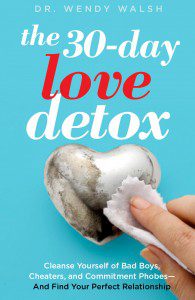 I’m delighted to have Wendy Walsh, Ph.D., America’s thought-leader on relationships, as my guest today. Each week on CNN, she breaks down the psychology of sex, love, gender roles, divorce, parenting and other human behaviors. A former co-host of “The Doctors,” Dr. Walsh also lectures on evolutionary psychology and human mating strategies at California State University Channel Islands. She holds a B.A. in Journalism, a Masters degree in Psychology, and a Ph.D. in Clinical Psychology. She’s also author of the forthcoming The 30-Day Love Detox (Rodale; April 2013) and regular contributor to DatingAdvice.com. She explains why you shouldn’t consider self-love to be selfish. Here’s what she has to say:
I’m delighted to have Wendy Walsh, Ph.D., America’s thought-leader on relationships, as my guest today. Each week on CNN, she breaks down the psychology of sex, love, gender roles, divorce, parenting and other human behaviors. A former co-host of “The Doctors,” Dr. Walsh also lectures on evolutionary psychology and human mating strategies at California State University Channel Islands. She holds a B.A. in Journalism, a Masters degree in Psychology, and a Ph.D. in Clinical Psychology. She’s also author of the forthcoming The 30-Day Love Detox (Rodale; April 2013) and regular contributor to DatingAdvice.com. She explains why you shouldn’t consider self-love to be selfish. Here’s what she has to say:
Why Self-Love Isn’t Selfish at All
By: Wendy Walsh, Ph.D.
When I talk to people about the importance of self-love, I sometimes see eyes squint in suspicion, as if I am prescribing a boasting pride, a selfish greediness, or a narcissistic focus on one’s own beauty. But self-love is none of those things. In fact, boasting, greed, and vanity are often symptoms of someone who doesn’t love themselves enough.
But real self-love, the kind of confidence that bursts forth from deep within you and soars without fuel from other people’s compliments, is the best skill a human can have — and anyone can attain it. But it must mean silencing the critical voice in our own minds. If we allow a crazy lady to live in our heads and accuse us of emotional crimes we didn’t commit, we’ll spend our lives creating an external character to compensate for her nastiness — a public persona that isn’t warm and loving but defensive and hurtful. A person who loves her/himself can turn the volume down on self-hate and replace it with the voice of a loving mother.
Self-love involves three important emotional skills:
1. Healthy Pride: We were taught as children to be humble. We were told not to brag. Good lessons, it is true. But having a healthy pride means taking stock of the things we do really well and broadcasting them within. Are you a good friend, a good cook, a good financial manager, a good builder, a good artist, a good listener, a good athlete, a good talker, a good musician, a good gardener, a good writer, a good homemaker, a good provider, a good leader, a good parent, a good daughter, a good son, a good employee? Self-love begins with understanding what you are good at. Recognize it. Glorify it. Know that every person has a unique set of talents and skills. Find yours. Stare hard at them. Believe it. You’re gooood.
If you are having trouble with this part, I ask you to imagine that you have recently met yourself — and you are smitten! I mean in the deep loving sense, not the infatuated insincere way. Then sit down and write a love letter to yourself. This can be a very difficult exercise. Take some time with it. Notice things about yourself. Smile about things you’ve done well. Fall in love with the best part of you and feel a deep pride.
2. Forgiveness: Clearly no one is perfect. We make mistakes. We hurt people accidentally. We mess up at work and school. We let down our family. Falling in love with yourself means being able to look square in the face at your foibles and, instead of dismissing them with excuses or laying blame on others, it means forgiving. We must forgive ourselves if we are to let go and move on toward being better, more conscious people. Everyone messes up. But staying in a state of denial and blaming others for your less-than-perfect actions will keep you from finding peace and self-confidence.
3. Awareness of Your Own Needs: We live in a crazy society that tells people they shouldn’t be too “needy.” We should be independent. We should not need to reach out for help. If this were true, then we wouldn’t need to help ourselves either because we would have no needs. But we do! Every human being needs time, space, air, water, and companionship. And we must become aware of our own specific needs, find healthy ways to get them met, and set boundaries with people who are depleting us. In my new book The 30-Day Love Detox, I give straight talk to women about discovering their needs — their need for a healthy relationship, their need for motherhood, and their need for a healthy sex life.
Sometimes self-love may simply mean saying no to others so you can practice self-care — eating well, exercising, and meditating. Sometimes it is a need for companionship (as vital as air for human survival) and we need to give ourselves permission to get that need met in a healthy way. Becoming aware of our needs is the first step to getting them met.
Loving yourself makes you better equipped to loving other people. When you are less dependant on emotional crutches – false friendships, material decorations and artificial social status — you will be free to give effortlessly. Self-love allows you to give abundantly and expect nothing in return. Remember what the flight attendant tells you. You have to put your own oxygen mask on first before you can assist others. That’s self-love.
***************
Check out The 30-Day Love Detox when it comes out in April!
***************
Join the Self-Love Movement! Take the 31 Days of Self-Love Commitment and get my book, How Do I Love Me? Let Me Count the Ways for free at http://howdoiloveme.com. Read my 2013 31 Days of Self-Love Posts HERE.
Please leave comments under my posts so we can stay connected.

